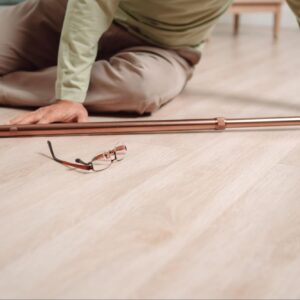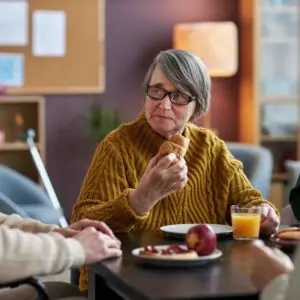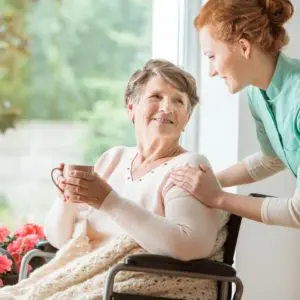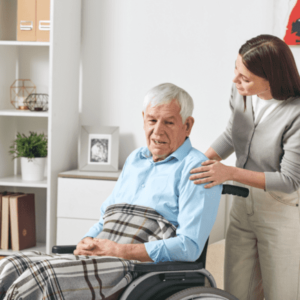 It can be hard to decide what type of care is best for your loved ones as they age. Many older adults don’t want to leave their homes, even if diagnosed with dementia or Alzheimer’s disease. Rather than relocating to an assisted living facility or nursing home, they want to continue living in their home to stay connected to their community and maintain independence. When this happens, senior home care becomes a practical option.
It can be hard to decide what type of care is best for your loved ones as they age. Many older adults don’t want to leave their homes, even if diagnosed with dementia or Alzheimer’s disease. Rather than relocating to an assisted living facility or nursing home, they want to continue living in their home to stay connected to their community and maintain independence. When this happens, senior home care becomes a practical option.
Home care aides help seniors age comfortably in their own homes with services that are personalized to their individual needs. If you’re considering home care for your loved one, there are some things to remember that will help ensure they are happy, healthy, and safe. We put together this guide to help you understand those factors so you can make the right decision for their care and ensure they age in a safe and comfortable environment.
What is Home Care?
Home care is any professional support service that allows a person to live safely in their home. Professional caregivers such as nurses, aides, and therapists provide short-term and long-term care in the home, depending on the person’s needs. They care for aging individuals who have serious medical conditions, need assistance to live independently, manage chronic health issues, recover from a medical setback, or have special needs or a disability. They also provide companionship and assistance with basic household tasks. Home care aids are appropriate for those who want to stay in their home and need ongoing care that family members or friends cannot provide.
Home care aides visit the home daily or just a few times a week, depending on the level of care a person needs. Most home care aides help with non-medical services, but skilled health care services can also be delivered at home, including:
- Assistance with daily activities such as dressing, walking, bathing, and using the toilet
- Managing tasks around the home, including light housekeeping and meal preparation
- Companionship and supervision
- Therapy and rehabilitation services
- Medication Management
- Short or long-term nursing care for an illness, disease, or disability
Home care differs from other forms of elderly assistance, like nursing homes and assisted living facilities. While some nursing homes are designed to mimic a home and not feel like a hospital, they can sometimes remove an individual’s independence and lead to frustration. Nursing homes also have a rotating staff of medical professionals to assist with everyday activities and serve residents three meals a day. Assisted living facilities offer seniors care in a residential setting that isn’t their home while providing social engagement and amenities for a healthy lifestyle. They cater to seniors who can live independently but generally don’t provide personalized care.
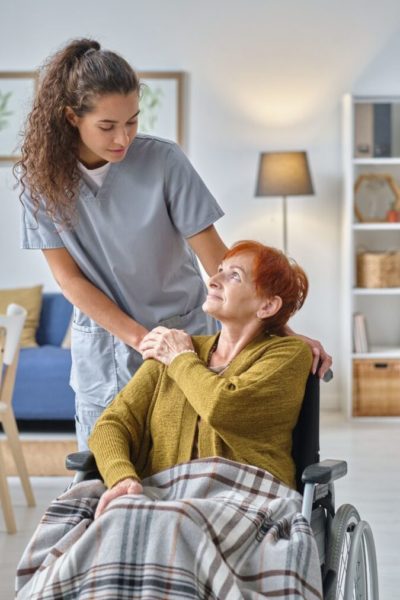
Benefits of Home Care for the Elderly
Home care enables safety, security, and increased independence, helping your loved one achieve the highest quality of life possible. Home care is an alternative to full assisted living if they need help with basic tasks or are experiencing memory loss but are otherwise reasonably healthy. It can ease management of an ongoing medical condition and avoid unnecessary hospitalization through care given in the comfort and familiarity of home. For many families, home care is the best solution because it allows their loved one to stay home and continue to live the life they’re used to living. There are many benefits of home care, such as:
- Comfort: Your loved one can stay in the place where they are most comfortable. They can sleep in their own bed, use their own bathroom, and continue their daily routine.
- Personalized care: Rather than adjust to a nursing home or care facility’s schedule, a home care plan is personalized and designed to fit your loved one’s routine.
- Family Involvement: Home care allows the family to be a large part of their loved one’s care plan, with a direct line of communication between caregiver and care manager. It also provides a break for family members maintaining full-time jobs.
- Independence: Loss of independence is a primary concern for seniors when their family considers care options. Home care allows them to maintain control of their daily lives, choosing when they want to eat, sleep, and socialize.
- Companionship: Seniors who live alone often feel isolated and lonely, which can lead to a decline in health. Home care aides can provide your loved one with a familiar face, friendly conversation, and a meaningful human connection.
- Peace of mind: You won’t have to worry about a loved one falling and injuring themselves as they perform their daily activities, such as showering or cooking. You’ll be able to rest easy knowing they are receiving good care.
- Stay together: Home care allows elderly couples who need different levels of care to continue living together in their home. Separating elderly couples can lead to mental health concerns and poor health.
Warning Signs a Senior May Need Home Care
Noticing the subtle signs that your loved one may need help at home will ultimately lead to a safer and happier environment for them. Hiring a home care aide can help resolve more issues than you might realize. Sometimes, the signs that your loved one may need help at home aren’t so obvious.
In many situations the need for care will creep up on a family. Oftentimes, family members are acting as caregivers without realizing it. As the need for care increases, it can either seem like a normal part of aging or people are just not willing to admit that their ability to live independently is no longer possible—or safe. But there are warning signs people should be looking for that will help them recognize when the time for professional long-term care has arrived:
Physical Deterioration: Look for signs such as significant weight loss, balance issues and falling, loss of strength and stamina, and other losses of “Activities of Daily Living” known as an ADL such as ability to shower or toilet, dress, or eat independently.
Mental Deterioration: Do not blow off loss of memory or confusing names, dates and locations as just a “senior moment”. Cognitive deterioration is an important warning sign to be on the lookout for dementia and Alzheimer’s. These conditions can worsen quickly and can lead to many physical breakdowns and safety issues that are easily spotted.
Lifestyle Deterioration: Is your loved one’s appearance now disheveled? Is the home not being kept as neatly as in the past? Are things oddly out of place (a house plant in the fridge, pots and pans in the bathtub), or are there signs of physical damage (the car crashing into a fence or the wall of the garage, burn marks on the kitchen wall from a flash fire)? Long-term care is both a matter of healthcare and safety.
Memory Loss
It’s normal to forget some things as you age. Forgetting the names of old friends or misplacing your car keys are signs of mild forgetfulness. It’s a normal part of aging and not a serious problem. it’s one thing to walk into a room and not remember what you are looking for but it’s quite another to not know where you are. However, if your loved one’s memory loss gets worse over time, forgetfulness can lead to unpaid bills and missed medication or appointments, which can lead to serious health or financial consequences. Home care can help make these tasks more manageable, especially those who may otherwise be in good physical condition and aren’t ready to move into assisted living or nursing homes.
Aging Partners
When older individuals begin to experience health declines, it can become difficult to care for a partner, who may also be experiencing complex health conditions. Home care is an excellent option for elderly couples, who wish to age together in their home. Home care services can also provide different levels of care, particularly when one spouse develops health concerns and their partner cannot care for them.
Falls
As our loved ones age, they may begin to experience falls as they perform basic tasks— changing a light bulb or going up and down the stairs. Illness, medication, and loss of muscle mass can reduce their steadiness and coordination, so falls remain a top cause of seniors’ accidents. A home care aide can help prevent injury or a long and costly hospital stay by preventing them from engaging in household tasks or activities where they may be more prone to falling.
Loneliness
As individuals age, they can sometimes feel isolated and lonely, especially if they don’t have family members who live near them and cannot engage in social activities outside of their homes. Social isolation can lead to higher rates of depression and anxiety. Many seniors in this situation may be physically able to care for themselves but just need companionship to stay motivated and engaged. Home care aides can provide companionship and transportation for seniors who feel alone.

Determining if Home Care Is the Best Option
Each senior’s situation is different and requires different types of care services. Some may need help getting around their home, while other seniors require more complex, medically focused care. Navigating the various aspects of home care can be overwhelming, especially if you’re unsure what type of care is best suited for your loved one. Home care is ideal for those who need companionship, assistance with reminders and household tasks, and a high level of care to avoid hospitalization.
If your loved one needs someone to be with them 24 hours a day, home care may not be the best option. They should consider a nursing home or assisted living facility, depending on their needs. If their mobility is declining and their home isn’t easily accessible for this transition, home care isn’t ideal. In this instance, they should consider an assisted living facility. A care manager or home care aide can assess your loved one’s needs and develop a care plan or alternate care options best suited for them.
Paying for Home Care
Families are often concerned about how much home care services cost and what financial options there are for payment. Costs of home care vary across agencies, regions, and service types. It’s essential to understand your payment options before making the decision about home for your loved one. The popular options for funding your loved one’s home care are Medicare & Medicaid, health insurance, life insurance, reverse mortgages, VA Aid & Attendance, or paying out of pocket.
Medicare & Medicaid
In most cases, Medicare and Medicaid will pay for medically necessary services provided in a home setting, with coverage limits by the agency you choose.
Medicare focuses on necessary medical care and short-term care for conditions that will improve through rehabilitation services. So, in most limited cases, Medicare won’t pay for long-term care such as help bathing, dressing, eating, moving around, or using the bathroom. However, there are certain instances in which Medicare may contribute, such as physical and occupational therapy, short-term hospital stays, and hospice care. Medicare also requires the individual’s doctor to certify that the care is necessary. Medicare will also fund hospice care received at home.
Medicaid is the largest public funder of long-term care services. It covers long-term home care services like help bathing or dressing for those who meet certain eligibility requirements that vary by state. If you’re eligible, the state will also make an additional determination on whether your loved one qualifies for long-term care services at home. But Medicaid funded care received at home is available on a limited basis.
Health Insurance
While there are exceptions, health insurance may have limited coverage for some aspects of long-term home care. Most health insurance policies cover some doctor-prescribed home care for health issues, usually following a hospital stay. However, no health insurance policy will fully cover long-term care. Nonetheless, you should check with your private health insurance to understand what is and isn’t covered.
Out of Pocket
Some families choose to pay for home care privately from their income, savings, or sharing expenses with other family members. If your loved one needs minimal assistance (one or two brief visits a week), helping out yourself or paying out of pocket for home care may be a good option. However, as expenses rise, this may become more and more challenging for those on a fixed income.
Private Pay
Seniors on a fixed income looking to pay for home care may be able to access a variety of options based on assets or benefit programs.
The owner of a life insurance policy can consider selling their life insurance policy for cash using Long-term care (LTC) life settlements and then set up a LTC Benefit Account to make monthly payments towards care. This option is designed for seniors who want to unlock the value in a life insurance policy that they no longer need to pay for any form of senior living and long-term care they may want.
Life settlements are another financially savvy way to free up cash to help you or your loved one stay in your home and pay for your in-home care. As the sale or transfer of the death benefit or ownership of a life insurance policy, your loved one can sell it and use the money they receive to fund their home care.
Veteran’s Aide & Attendance Benefits are for veterans of active combat duty and/or their spouses are eligible to receive monthly benefits paid directly towards qualifying long-term care service. Like Medicaid, the applicant must meet both medical necessity and income/asset level requirements to qualify.
Reverse Mortgage
Homeowners with little to no remaining mortgage balance that are age 62 or older can qualify to take a HUD backed Home Equity Conversion Mortgage (HECM) loan against the home in the form of a lump sum, monthly income or a line of credit. To qualify the home must still be the primary residence and the loan must be paid back with interest and fees after the homeowner dies (typically through the sale of the property).
Home care can provide your loved one with the opportunity to continue living in their home, with help they need with cooking, cleaning, bathing, and performing other parts of their daily routine. You know they will have personalized care that meets their needs. They will have a friendly and familiar face visiting them daily or weekly for continued comfort. The experts at Retirement Genius can guide you through your options and help you decide if home care is the right fit for you and your family, and the best approach. Contact the experts at Retirement Genius today.
Bio: Chris Orestis is the founder and President of Retirement Genius and an expert in strategic retirement planning. Having appeared on CNBC, Fox News, and USA Today, Chris uses his 25-plus years of retirement experience to help seniors transition to the next chapter of their lives with grace and financial security.


